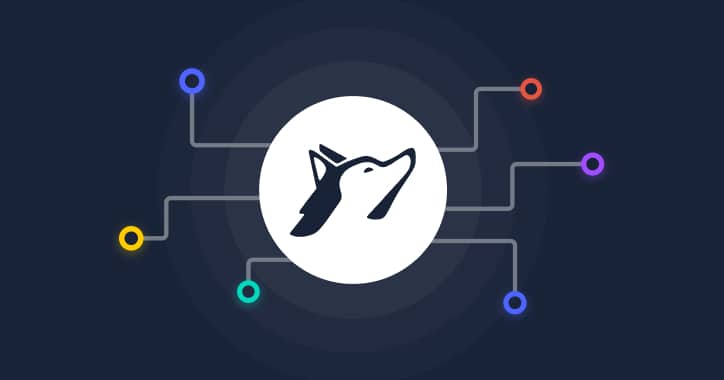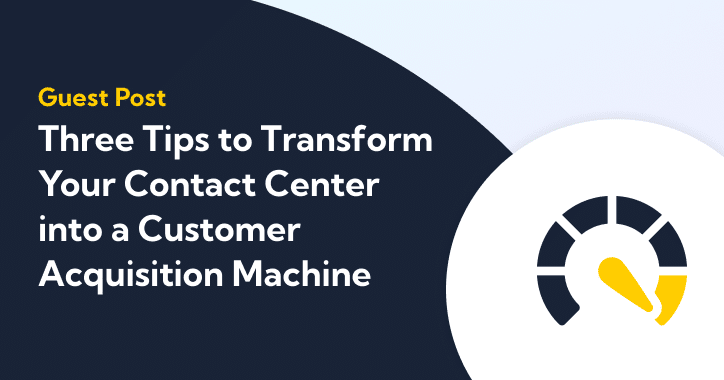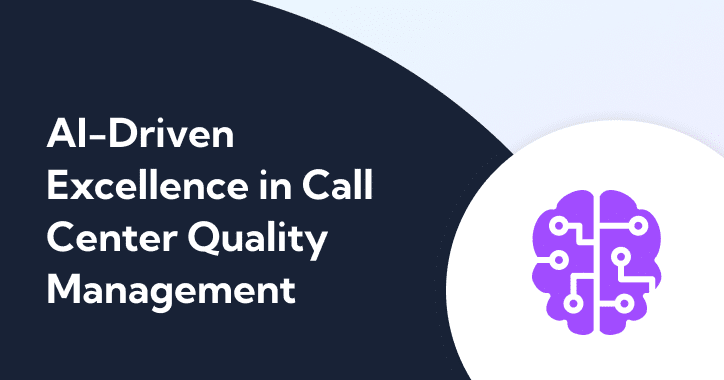
Based on the nature of their job, contact center agents are expected to have excellent communication skills. Additionally, agents are expected to be:
- Able to adapt to sudden change;
- Comfortable in fast-paced environments;
- Empathetic;
- Tech-savvy.
Some call center employees lack a few necessary skills needed to succeed in their roles. However, with personalized coaching driven by speech analytics, call centers can ensure their staff’s baseline skill level is above sub-par. Let’s dive in and see how.
What is Speech Analytics in Contact Centers?
Speech analytics in contact centers refers to the use of advanced technology and software to analyze and interpret the content and characteristics of spoken interactions between agents and customers. It involves the application of speech recognition, natural language processing, and machine learning techniques to transcribe, analyze, and derive actionable insights from call recordings of customer interactions.
Speech analytics software processes audio data to convert it into searchable text transcripts. It then applies various algorithms and linguistic models to analyze the transcriptions and extract meaningful information from spoken words. Speech analytics tools can detect and measure factors such as speech patterns, keywords, sentiment, emotions, talk time, silence, and more.
How Does Speech Analytics Software Help Contact Centers?
Besides coaching (which we’ll explore in-depth below) the main benefits of speech analytics software in contact centers are:
Quality Monitoring
Speech analytics helps evaluate the quality of customer conversations by identifying agents’ adherence to predefined scripts, regulatory compliance, and customer service standards. It allows contact center managers to monitor if agents are providing accurate and consistent information, adhering to legal and compliance requirements, and delivering a positive customer experience.
Customer Satisfaction Insights
Speech analytics can uncover valuable customer insights by analyzing customer sentiment, needs, preferences, and pain points expressed during interactions. These deep insights help identify trends, gather customer data, identify customer experience gaps, and drive improvements in products, other digital channels, services, and processes.
Compliance and Risk Management
Speech analytics assists in monitoring and ensuring compliance with legal, regulatory, and industry-specific requirements. It helps identify instances of non-compliance, breaches, or unethical behaviors, enabling timely intervention and risk mitigation.
Root Cause Analysis
By analyzing large volumes of customer interactions and voice data, speech analytics can identify recurring issues, common problems, and root causes of customer dissatisfaction. This information can guide process improvements, improve compliance, and enable proactive measures to prevent similar issues in the future.
Industry Example: Speech Analytics in Collections
Several industries benefit from using speech analytics in their tech stacks. As an example, let’s explore how collection agencies can leverage real-time speech analytics.
Compliance
Reducing compliance deficits is the most common reason collectors might use speech analytics tools. In particular, collectors use it to ensure that collections calls are always using compliance language and sticking to a script:
- Detect Non-Compliant Language: There are a variety of things collectors just aren’t allowed to say, most of which need no introduction. Speech analytics tools are designed to catch all of them – live in call – and help the collector self-correct before the conclusion of their conversation.
- Ensure Collectors Use Disclaimers: Real-time solutions ensure the collectors always read the mini-Miranda, respect 2-party consent rules, and follow other legal requirements within their collections calls. Did a collector forget to mention something important? Speech analytics software can recognize the mistake and remind the collector to revisit them before the call finishes.
- Reduce Lawsuits From Litigious Consumers: Collectors often utilize real-time speech analytics to detect calls where the consumer is attempting to lead the call in a particular direction.
Quality Assurance (QA)
Collectors often use speech analytics for Quality Assurance purposes, correcting communication mistakes like talking too fast, not using active listening, or failing to understand the consumer’s underlying issues. On the other side of the spectrum, this manifests itself in the form of foul language, misleading statements, or failing to empathize with the consumer. Some specific examples include:
- Ensure Collectors Uphold Service Level Agreements (SLAs): For third-party collections in particular, upholding the agreements formed with clients with the foundation of a successful relationship. Collection agencies utilize real-time speech analytics to prove that their collectors are using the language that is mutually agreed upon with their customers.
- Ensure Collectors Use Effective Scripting: One of the most frequent challenges in quality assurance is the variety of different communication styles collectors employ, with some working better than others. Real-time speech analytics tracks each call and alerts collectors when they deviate from pre-approved scripting to help them back on track.
- Reduce Collector Mistakes: There are a few moments on every call that play an outsized role in determining whether the call will be successful. Real-time speech analytics make sure collectors say the right things in those high-impact moments throughout the conversation.
Operations
Another common use case for real-time speech analytics centers around operations; in particular, collecting the highest average amount possible from each phone call. This is usually a function of two areas – improving average liquidation rates and reducing the number of calls required to collect in full. Real-time speech analytics assists with both:
- Enhanced Negotiation Strategies: Speech analytics tools detect when a consumer is giving payment objections and instantly prompt collectors with effective negotiation strategies to overcome them.
- Improved Empathy Towards Consumers: These tools understand when collectors aren’t empathizing with consumers and prompt them with helpful things they can do to improve. This is particularly important, as empathy is a significant factor in collecting as much as possible.
- Better Questions and Listening Skills: When collectors can improve in a given area, real-time speech analytics solutions like Balto prompt them with positive coaching strategies while the call is fresh.
Automatically Coach New Collectors:
Finally, collectors use real-time speech analytics solutions to enhance training and coaching for new collectors. Because these solutions provide in-call alerts, new collectors can learn new skills while also producing revenue for their agency.
- Build Great Habits from Day One: When new collectors hit the phones for the first time, it’s easy for them to pick up bad habits. Real-time speech analytics ensure that agents pick up the right habits the first time when habit-building is most effective.
- Train Collectors Without Losing Phone Time: Traditionally, training new reps also means taking them off the phones. With speech analytics, collectors can learn new skills while also collecting revenue for their agency. It’s the best of both worlds.
- Increase Confidence Through Better Call Performance: When collectors aren’t successful, they lose confidence which reduces performance and increases employee turnover.
Why is Contact Center Coaching Important?
Call center coaching is beneficial (and necessary) to ensure both established and new agents are up to date on workplace processes. However, implementing poor coaching techniques can be just as damaging to a contact center as failing to implement coaching at all. A few call center coaching challenges include, but aren’t limited to:
- Making time to prepare for sessions;
- Finding bandwidth to complete training;
- Scaling the amount of education and time to spend on each session.
One solution to the troubles above is considering real-time coaching. Just as it sounds, real-time coaching is a system that assists contact center managers with identifying coaching opportunities in real-time.
The Importance of Real-time Coaching
Real-time coaching offers the best feedback possible. In return, contact center agents can apply constructive criticism promptly, which can help improve their overall performance and customer satisfaction.
It also helps pinpoint exactly where an agent’s performance needs to be enhanced. For instance, with the help of this system, coaches can provide useful feedback to agents, such as what trigger words are and how to identify them.
While it may be tempting to provide feedback based on personal preference rather than constructive criticism, it’s important to refrain from doing so. This can be seen as micromanaging and overly critical.
Even when it’s unintentional, micromanaging is seen as a poor coaching practice. In fact, according to a Yoh Survey on the lack of respect in the workplace, out of 1,000 employees studied:
- 37% would quit if their manager was overly critical;
- 35% would quit if their manager micromanaged them;
- 34% would quit if they felt their voice and opinions weren’t being heard.
This coaching should tailor feedback in such a way as to show the utmost respect for call center agents.
The Benefits of Speech Analytics to Real-time Coaching
Real-time speech analytics is a technology that understands customer calls and automatically alerts call center agents with the best thing to say, live on each call. Blending speech analytics with real-time coaching gives managers the ability to provide valuable feedback.
This isn’t the only way speech analytics improves real-time coaching. Let’s take a closer look at the additional benefits of speech analytics.
Shortens Training Time
Real-time coaching can shorten the amount of time managers spend finding training opportunities. Speech analytics helps reduce training time even more.
Real-time speech analytics can instantly respond to a rep’s query without wasting valuable time. Because it is a system instead of a person, every agent can utilize real-time speech analytics. Whereas coaches are unable to provide instant, one-on-one advice to every agent.
Personalized Training Experience
Not every agent needs extensive training in the same areas. While one rep needs guidance on staying on script, another may need help reducing call handling times. Real-time speech analytics only trains agents on what — as determined by the analytics system — needs improving.
In comparison, call center coaches tend to educate employees en masse with a standard processes guide and training exercises. While doing so is still beneficial, it doesn’t have as much of an impact on trainees as personalized training experiences can with speech analytics.
Self-reliant Training
Last but certainly not least, speech analytics helps promote self-efficiency in the workplace. When call center representatives can go to work knowing they’ll receive help on-demand rather than having to wait, it can encourage them to go above and beyond in return.
Self-reliant training also helps hold reps accountable for the level of customer service they provide. Notifying agents in real-time of what they need to improve on eliminates the excuse of not knowing what to do if a job is done poorly and improves operational efficiency.
How To Use Speech Analytics for Real-time Coaching
Now that the benefits of real-time speech analytics have been established, it’s time to discuss how it’s used. Listed below are a few ways to use speech analytics for real-time coaching.
Flag Trigger Words
A trigger word is an important word or phrase frequently used in customer service interactions. There are numerous examples of popular trigger words and phrases during customer calls, a few of which are:
- How are you;
- I can help;
- I understand;
- Thank you for bringing this to my attention.
Speech analytics systems help identify the above trigger words and more. In return, these systems use this information to educate agents on trigger words to say on calls.
Automate Lessons and Instructions
If real-time coaching intends to offer instant guidance, then automating the way call reps receive training lessons is a must. One way to achieve this is by implementing multiple systems including speech analytics programs and other AI programs, such as real-time quality assurance.
In doing so, not only are you generating instant lessons and instructions, but it also helps you keep on track with current call center trends.
Flag Areas of Improvement or Exceptional Performance
Speech analytics notifies representatives when they can improve. It can flag moments of exceptional agent performance as well.
A few exceptional performance examples worthy of being flagged include excellent conversation techniques and high-quality messaging. It’s important to note that if an AI recognizes hard work in an agent, then it’s important they receive personal recognition as well.
Empower Your Agents With Balto’s Real-Time Guidance
While there are several speech analytics options for coaching, we’re partial to our Real-Time Guidance platform.
Balto is an enterprise solution that can help contact centers achieve measurable results by helping your agents satisfy more customers, retain more clients, and close more sales. We have three primary services: Real-Time Guidance for empowering agents, Real-Time QA for automatic call scoring, and Real-Time Coaching for proactive coaching.
Or if you’d rather jump to the chase, schedule a demo here.






